Business Environment Report: GSK and AZ Analysis
VerifiedAdded on 2020/01/07
|23
|6921
|261
Report
AI Summary
This report provides a comprehensive analysis of the business environment impacting GlaxoSmithKline (GSK) and AstraZeneca (AZ). It identifies the purposes of various organizations, assesses stakeholder objectives, and examines the responsibilities of GSK towards its stakeholders. The report also evaluates the impact of UK government fiscal and monetary policies, competition and regulatory policies, and the forces of demand and supply on GSK and AZ. Furthermore, it analyzes the influence of the PESTEL framework, cultural environment, international trade, global factors, and EU policies on these multinational companies. The report also discusses different economic systems and market structures, providing a thorough understanding of the business landscape in which GSK and AZ operate.

BUSINESS
ENVIRONMENT
ENVIRONMENT
Paraphrase This Document
Need a fresh take? Get an instant paraphrase of this document with our AI Paraphraser
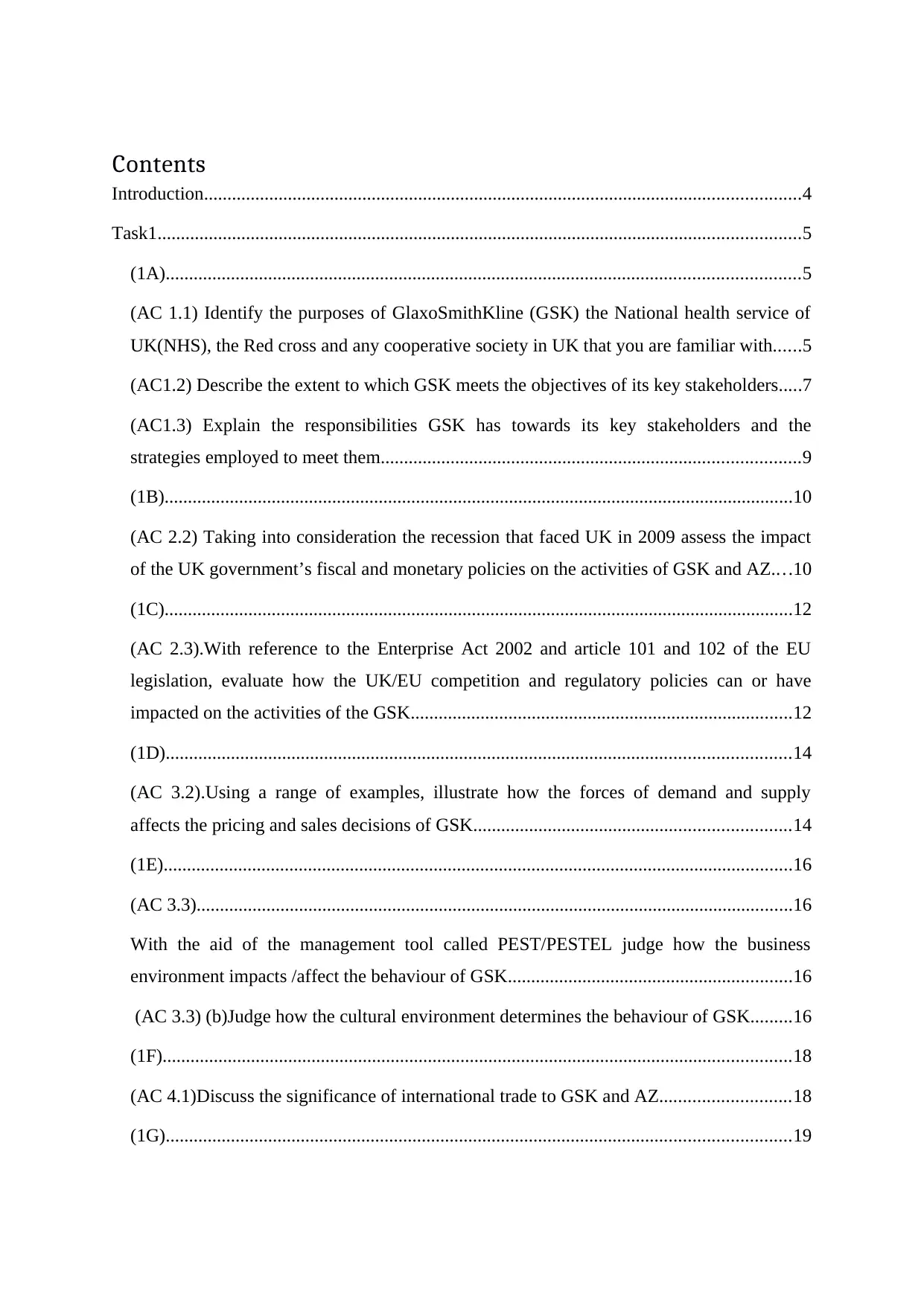
Contents
Introduction................................................................................................................................4
Task1..........................................................................................................................................5
(1A)........................................................................................................................................5
(AC 1.1) Identify the purposes of GlaxoSmithKline (GSK) the National health service of
UK(NHS), the Red cross and any cooperative society in UK that you are familiar with......5
(AC1.2) Describe the extent to which GSK meets the objectives of its key stakeholders.....7
(AC1.3) Explain the responsibilities GSK has towards its key stakeholders and the
strategies employed to meet them..........................................................................................9
(1B).......................................................................................................................................10
(AC 2.2) Taking into consideration the recession that faced UK in 2009 assess the impact
of the UK government’s fiscal and monetary policies on the activities of GSK and AZ....10
(1C).......................................................................................................................................12
(AC 2.3).With reference to the Enterprise Act 2002 and article 101 and 102 of the EU
legislation, evaluate how the UK/EU competition and regulatory policies can or have
impacted on the activities of the GSK..................................................................................12
(1D)......................................................................................................................................14
(AC 3.2).Using a range of examples, illustrate how the forces of demand and supply
affects the pricing and sales decisions of GSK....................................................................14
(1E).......................................................................................................................................16
(AC 3.3)................................................................................................................................16
With the aid of the management tool called PEST/PESTEL judge how the business
environment impacts /affect the behaviour of GSK.............................................................16
(AC 3.3) (b)Judge how the cultural environment determines the behaviour of GSK.........16
(1F).......................................................................................................................................18
(AC 4.1)Discuss the significance of international trade to GSK and AZ............................18
(1G)......................................................................................................................................19
Introduction................................................................................................................................4
Task1..........................................................................................................................................5
(1A)........................................................................................................................................5
(AC 1.1) Identify the purposes of GlaxoSmithKline (GSK) the National health service of
UK(NHS), the Red cross and any cooperative society in UK that you are familiar with......5
(AC1.2) Describe the extent to which GSK meets the objectives of its key stakeholders.....7
(AC1.3) Explain the responsibilities GSK has towards its key stakeholders and the
strategies employed to meet them..........................................................................................9
(1B).......................................................................................................................................10
(AC 2.2) Taking into consideration the recession that faced UK in 2009 assess the impact
of the UK government’s fiscal and monetary policies on the activities of GSK and AZ....10
(1C).......................................................................................................................................12
(AC 2.3).With reference to the Enterprise Act 2002 and article 101 and 102 of the EU
legislation, evaluate how the UK/EU competition and regulatory policies can or have
impacted on the activities of the GSK..................................................................................12
(1D)......................................................................................................................................14
(AC 3.2).Using a range of examples, illustrate how the forces of demand and supply
affects the pricing and sales decisions of GSK....................................................................14
(1E).......................................................................................................................................16
(AC 3.3)................................................................................................................................16
With the aid of the management tool called PEST/PESTEL judge how the business
environment impacts /affect the behaviour of GSK.............................................................16
(AC 3.3) (b)Judge how the cultural environment determines the behaviour of GSK.........16
(1F).......................................................................................................................................18
(AC 4.1)Discuss the significance of international trade to GSK and AZ............................18
(1G)......................................................................................................................................19
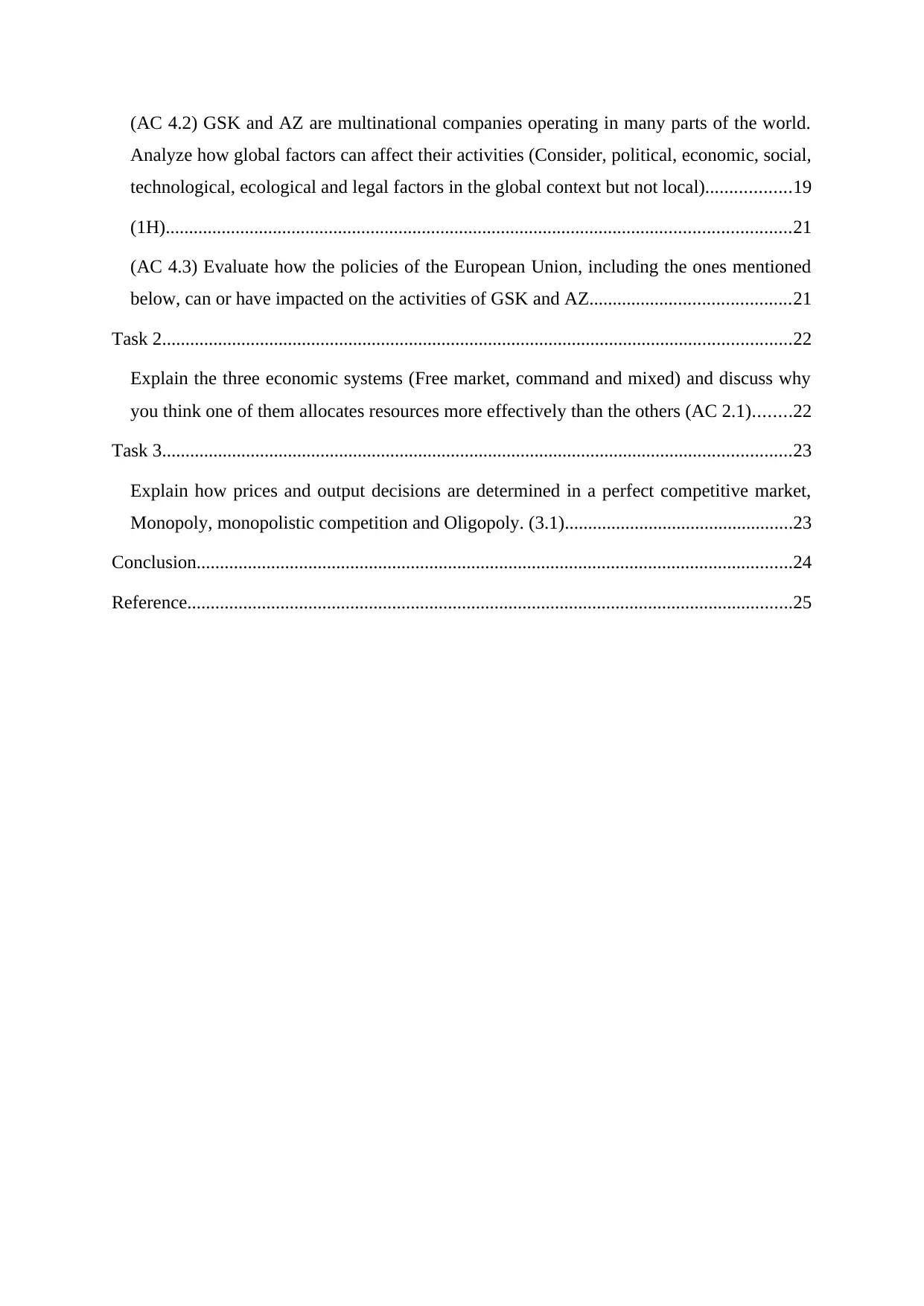
(AC 4.2) GSK and AZ are multinational companies operating in many parts of the world.
Analyze how global factors can affect their activities (Consider, political, economic, social,
technological, ecological and legal factors in the global context but not local)..................19
(1H)......................................................................................................................................21
(AC 4.3) Evaluate how the policies of the European Union, including the ones mentioned
below, can or have impacted on the activities of GSK and AZ...........................................21
Task 2.......................................................................................................................................22
Explain the three economic systems (Free market, command and mixed) and discuss why
you think one of them allocates resources more effectively than the others (AC 2.1)........22
Task 3.......................................................................................................................................23
Explain how prices and output decisions are determined in a perfect competitive market,
Monopoly, monopolistic competition and Oligopoly. (3.1).................................................23
Conclusion................................................................................................................................24
Reference..................................................................................................................................25
Analyze how global factors can affect their activities (Consider, political, economic, social,
technological, ecological and legal factors in the global context but not local)..................19
(1H)......................................................................................................................................21
(AC 4.3) Evaluate how the policies of the European Union, including the ones mentioned
below, can or have impacted on the activities of GSK and AZ...........................................21
Task 2.......................................................................................................................................22
Explain the three economic systems (Free market, command and mixed) and discuss why
you think one of them allocates resources more effectively than the others (AC 2.1)........22
Task 3.......................................................................................................................................23
Explain how prices and output decisions are determined in a perfect competitive market,
Monopoly, monopolistic competition and Oligopoly. (3.1).................................................23
Conclusion................................................................................................................................24
Reference..................................................................................................................................25
⊘ This is a preview!⊘
Do you want full access?
Subscribe today to unlock all pages.

Trusted by 1+ million students worldwide
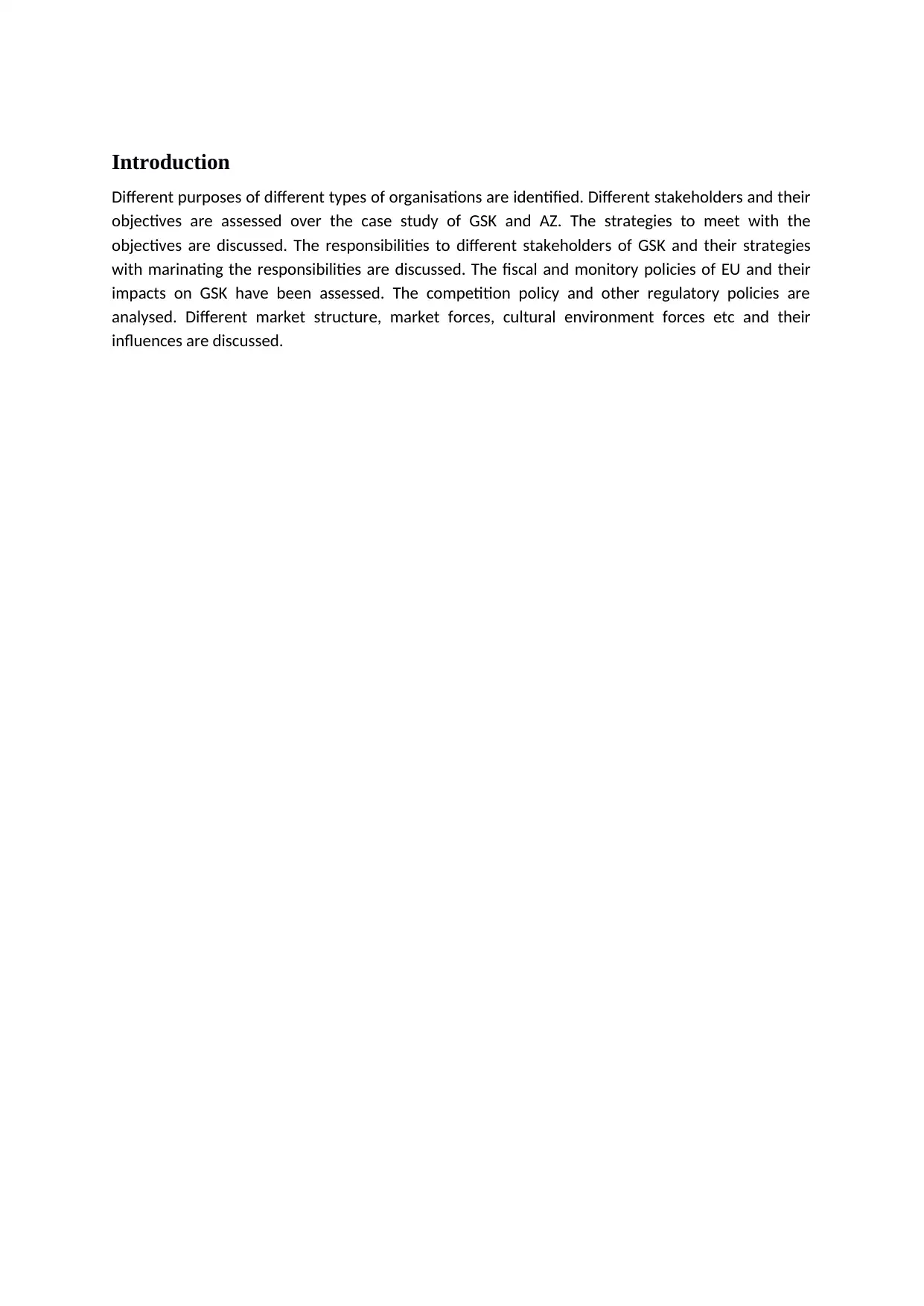
Introduction
Different purposes of different types of organisations are identified. Different stakeholders and their
objectives are assessed over the case study of GSK and AZ. The strategies to meet with the
objectives are discussed. The responsibilities to different stakeholders of GSK and their strategies
with marinating the responsibilities are discussed. The fiscal and monitory policies of EU and their
impacts on GSK have been assessed. The competition policy and other regulatory policies are
analysed. Different market structure, market forces, cultural environment forces etc and their
influences are discussed.
Different purposes of different types of organisations are identified. Different stakeholders and their
objectives are assessed over the case study of GSK and AZ. The strategies to meet with the
objectives are discussed. The responsibilities to different stakeholders of GSK and their strategies
with marinating the responsibilities are discussed. The fiscal and monitory policies of EU and their
impacts on GSK have been assessed. The competition policy and other regulatory policies are
analysed. Different market structure, market forces, cultural environment forces etc and their
influences are discussed.
Paraphrase This Document
Need a fresh take? Get an instant paraphrase of this document with our AI Paraphraser
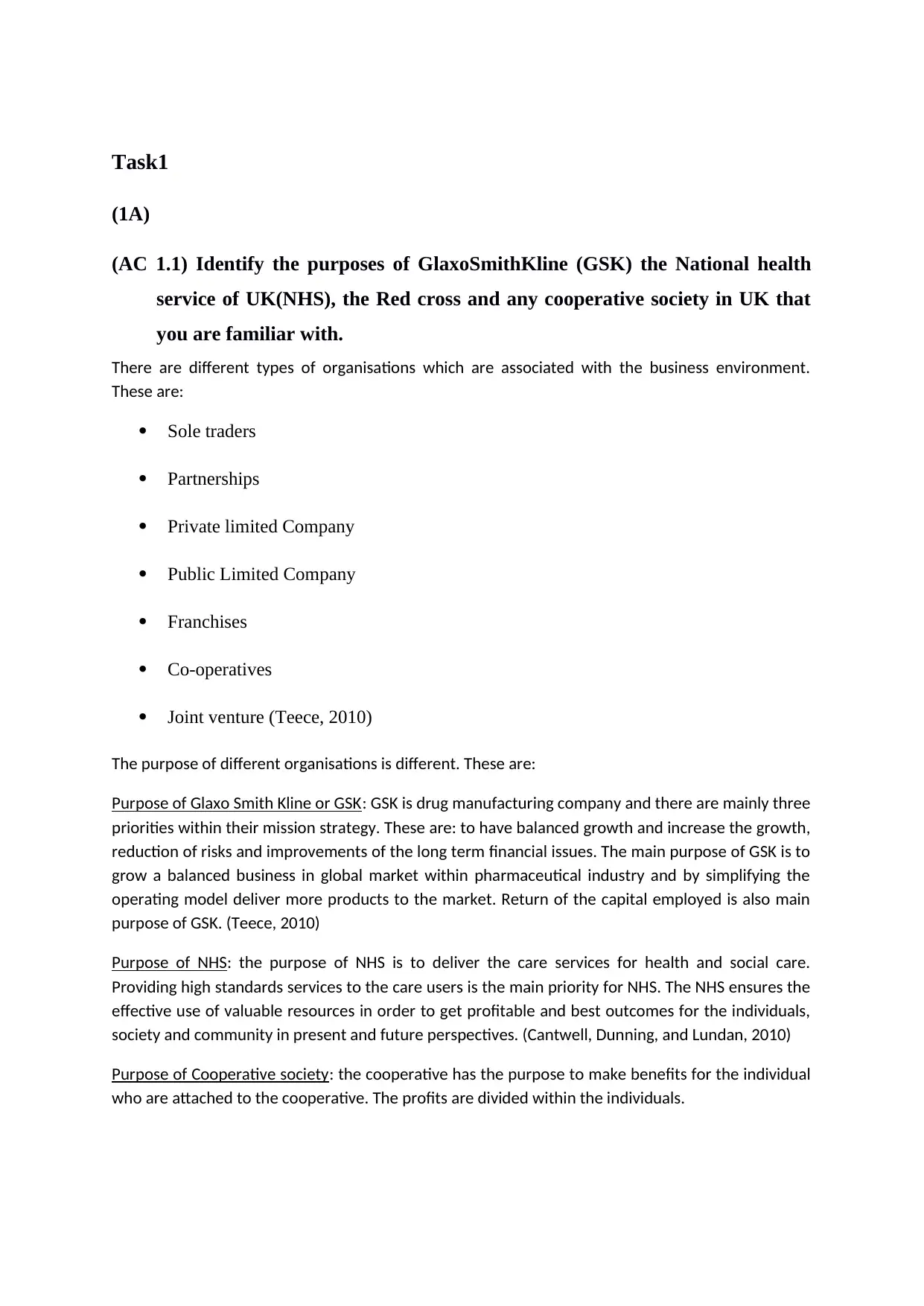
Task1
(1A)
(AC 1.1) Identify the purposes of GlaxoSmithKline (GSK) the National health
service of UK(NHS), the Red cross and any cooperative society in UK that
you are familiar with.
There are different types of organisations which are associated with the business environment.
These are:
Sole traders
Partnerships
Private limited Company
Public Limited Company
Franchises
Co-operatives
Joint venture (Teece, 2010)
The purpose of different organisations is different. These are:
Purpose of Glaxo Smith Kline or GSK: GSK is drug manufacturing company and there are mainly three
priorities within their mission strategy. These are: to have balanced growth and increase the growth,
reduction of risks and improvements of the long term financial issues. The main purpose of GSK is to
grow a balanced business in global market within pharmaceutical industry and by simplifying the
operating model deliver more products to the market. Return of the capital employed is also main
purpose of GSK. (Teece, 2010)
Purpose of NHS: the purpose of NHS is to deliver the care services for health and social care.
Providing high standards services to the care users is the main priority for NHS. The NHS ensures the
effective use of valuable resources in order to get profitable and best outcomes for the individuals,
society and community in present and future perspectives. (Cantwell, Dunning, and Lundan, 2010)
Purpose of Cooperative society: the cooperative has the purpose to make benefits for the individual
who are attached to the cooperative. The profits are divided within the individuals.
(1A)
(AC 1.1) Identify the purposes of GlaxoSmithKline (GSK) the National health
service of UK(NHS), the Red cross and any cooperative society in UK that
you are familiar with.
There are different types of organisations which are associated with the business environment.
These are:
Sole traders
Partnerships
Private limited Company
Public Limited Company
Franchises
Co-operatives
Joint venture (Teece, 2010)
The purpose of different organisations is different. These are:
Purpose of Glaxo Smith Kline or GSK: GSK is drug manufacturing company and there are mainly three
priorities within their mission strategy. These are: to have balanced growth and increase the growth,
reduction of risks and improvements of the long term financial issues. The main purpose of GSK is to
grow a balanced business in global market within pharmaceutical industry and by simplifying the
operating model deliver more products to the market. Return of the capital employed is also main
purpose of GSK. (Teece, 2010)
Purpose of NHS: the purpose of NHS is to deliver the care services for health and social care.
Providing high standards services to the care users is the main priority for NHS. The NHS ensures the
effective use of valuable resources in order to get profitable and best outcomes for the individuals,
society and community in present and future perspectives. (Cantwell, Dunning, and Lundan, 2010)
Purpose of Cooperative society: the cooperative has the purpose to make benefits for the individual
who are attached to the cooperative. The profits are divided within the individuals.
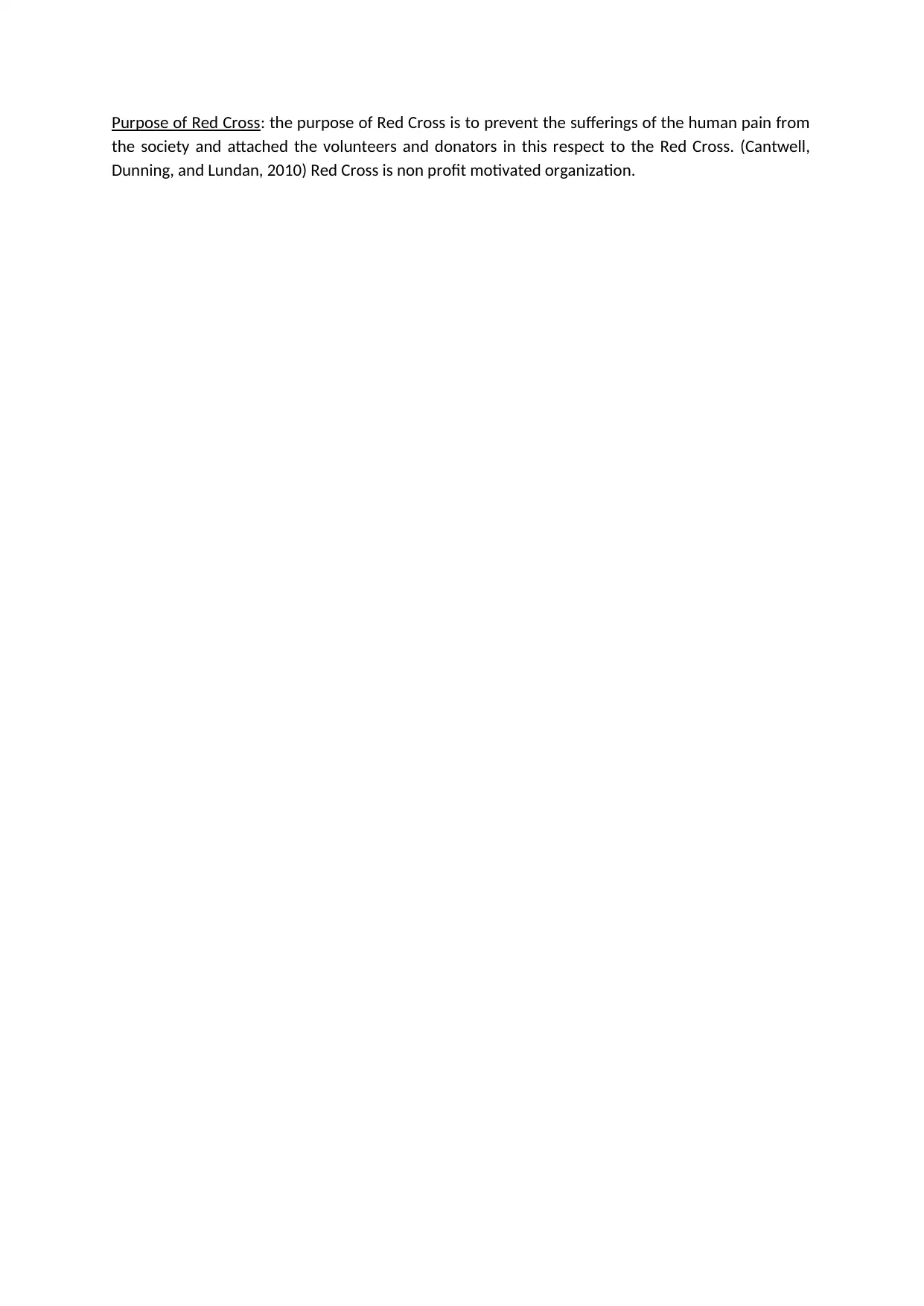
Purpose of Red Cross: the purpose of Red Cross is to prevent the sufferings of the human pain from
the society and attached the volunteers and donators in this respect to the Red Cross. (Cantwell,
Dunning, and Lundan, 2010) Red Cross is non profit motivated organization.
the society and attached the volunteers and donators in this respect to the Red Cross. (Cantwell,
Dunning, and Lundan, 2010) Red Cross is non profit motivated organization.
⊘ This is a preview!⊘
Do you want full access?
Subscribe today to unlock all pages.

Trusted by 1+ million students worldwide
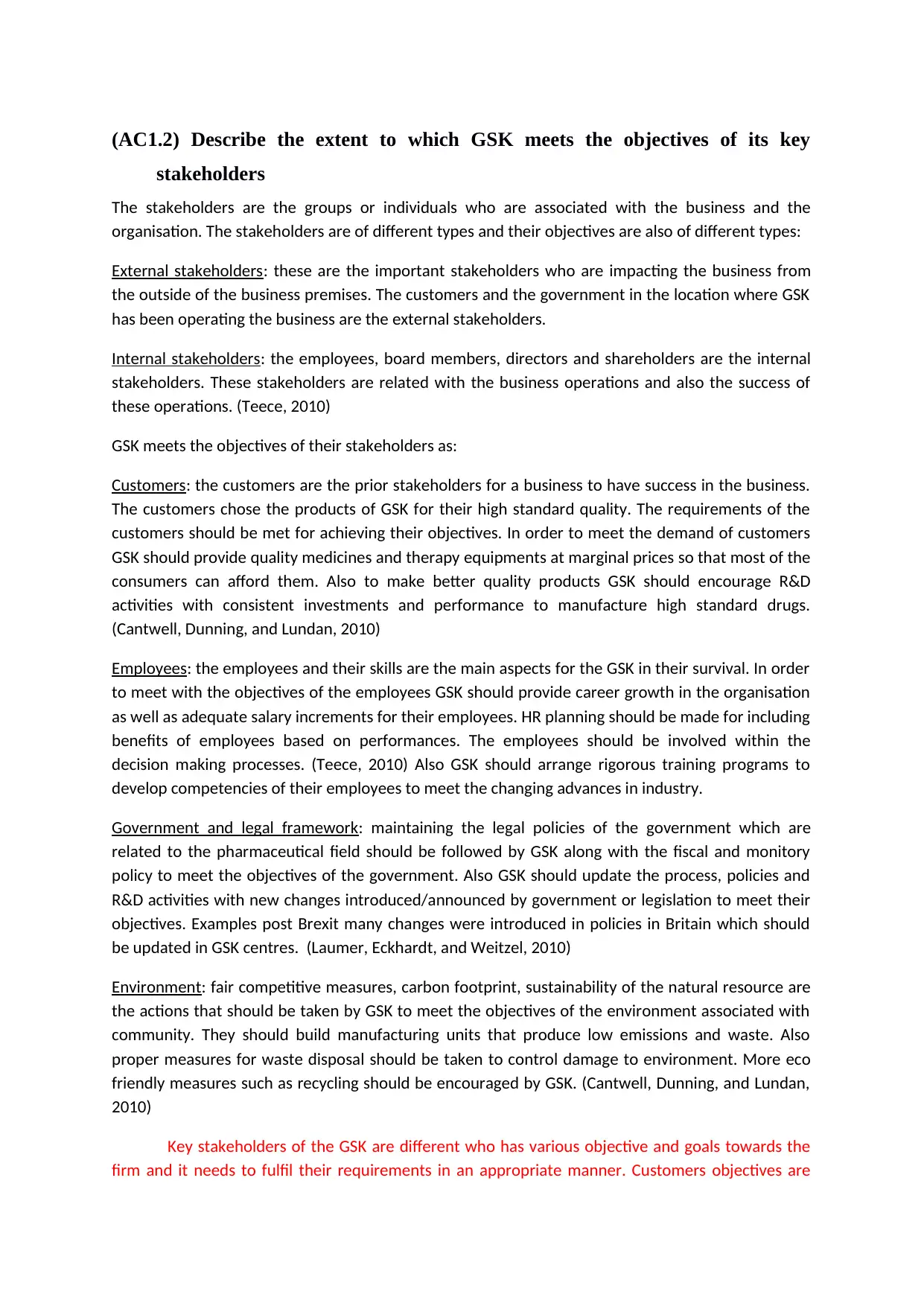
(AC1.2) Describe the extent to which GSK meets the objectives of its key
stakeholders
The stakeholders are the groups or individuals who are associated with the business and the
organisation. The stakeholders are of different types and their objectives are also of different types:
External stakeholders: these are the important stakeholders who are impacting the business from
the outside of the business premises. The customers and the government in the location where GSK
has been operating the business are the external stakeholders.
Internal stakeholders: the employees, board members, directors and shareholders are the internal
stakeholders. These stakeholders are related with the business operations and also the success of
these operations. (Teece, 2010)
GSK meets the objectives of their stakeholders as:
Customers: the customers are the prior stakeholders for a business to have success in the business.
The customers chose the products of GSK for their high standard quality. The requirements of the
customers should be met for achieving their objectives. In order to meet the demand of customers
GSK should provide quality medicines and therapy equipments at marginal prices so that most of the
consumers can afford them. Also to make better quality products GSK should encourage R&D
activities with consistent investments and performance to manufacture high standard drugs.
(Cantwell, Dunning, and Lundan, 2010)
Employees: the employees and their skills are the main aspects for the GSK in their survival. In order
to meet with the objectives of the employees GSK should provide career growth in the organisation
as well as adequate salary increments for their employees. HR planning should be made for including
benefits of employees based on performances. The employees should be involved within the
decision making processes. (Teece, 2010) Also GSK should arrange rigorous training programs to
develop competencies of their employees to meet the changing advances in industry.
Government and legal framework: maintaining the legal policies of the government which are
related to the pharmaceutical field should be followed by GSK along with the fiscal and monitory
policy to meet the objectives of the government. Also GSK should update the process, policies and
R&D activities with new changes introduced/announced by government or legislation to meet their
objectives. Examples post Brexit many changes were introduced in policies in Britain which should
be updated in GSK centres. (Laumer, Eckhardt, and Weitzel, 2010)
Environment: fair competitive measures, carbon footprint, sustainability of the natural resource are
the actions that should be taken by GSK to meet the objectives of the environment associated with
community. They should build manufacturing units that produce low emissions and waste. Also
proper measures for waste disposal should be taken to control damage to environment. More eco
friendly measures such as recycling should be encouraged by GSK. (Cantwell, Dunning, and Lundan,
2010)
Key stakeholders of the GSK are different who has various objective and goals towards the
firm and it needs to fulfil their requirements in an appropriate manner. Customers objectives are
stakeholders
The stakeholders are the groups or individuals who are associated with the business and the
organisation. The stakeholders are of different types and their objectives are also of different types:
External stakeholders: these are the important stakeholders who are impacting the business from
the outside of the business premises. The customers and the government in the location where GSK
has been operating the business are the external stakeholders.
Internal stakeholders: the employees, board members, directors and shareholders are the internal
stakeholders. These stakeholders are related with the business operations and also the success of
these operations. (Teece, 2010)
GSK meets the objectives of their stakeholders as:
Customers: the customers are the prior stakeholders for a business to have success in the business.
The customers chose the products of GSK for their high standard quality. The requirements of the
customers should be met for achieving their objectives. In order to meet the demand of customers
GSK should provide quality medicines and therapy equipments at marginal prices so that most of the
consumers can afford them. Also to make better quality products GSK should encourage R&D
activities with consistent investments and performance to manufacture high standard drugs.
(Cantwell, Dunning, and Lundan, 2010)
Employees: the employees and their skills are the main aspects for the GSK in their survival. In order
to meet with the objectives of the employees GSK should provide career growth in the organisation
as well as adequate salary increments for their employees. HR planning should be made for including
benefits of employees based on performances. The employees should be involved within the
decision making processes. (Teece, 2010) Also GSK should arrange rigorous training programs to
develop competencies of their employees to meet the changing advances in industry.
Government and legal framework: maintaining the legal policies of the government which are
related to the pharmaceutical field should be followed by GSK along with the fiscal and monitory
policy to meet the objectives of the government. Also GSK should update the process, policies and
R&D activities with new changes introduced/announced by government or legislation to meet their
objectives. Examples post Brexit many changes were introduced in policies in Britain which should
be updated in GSK centres. (Laumer, Eckhardt, and Weitzel, 2010)
Environment: fair competitive measures, carbon footprint, sustainability of the natural resource are
the actions that should be taken by GSK to meet the objectives of the environment associated with
community. They should build manufacturing units that produce low emissions and waste. Also
proper measures for waste disposal should be taken to control damage to environment. More eco
friendly measures such as recycling should be encouraged by GSK. (Cantwell, Dunning, and Lundan,
2010)
Key stakeholders of the GSK are different who has various objective and goals towards the
firm and it needs to fulfil their requirements in an appropriate manner. Customers objectives are
Paraphrase This Document
Need a fresh take? Get an instant paraphrase of this document with our AI Paraphraser
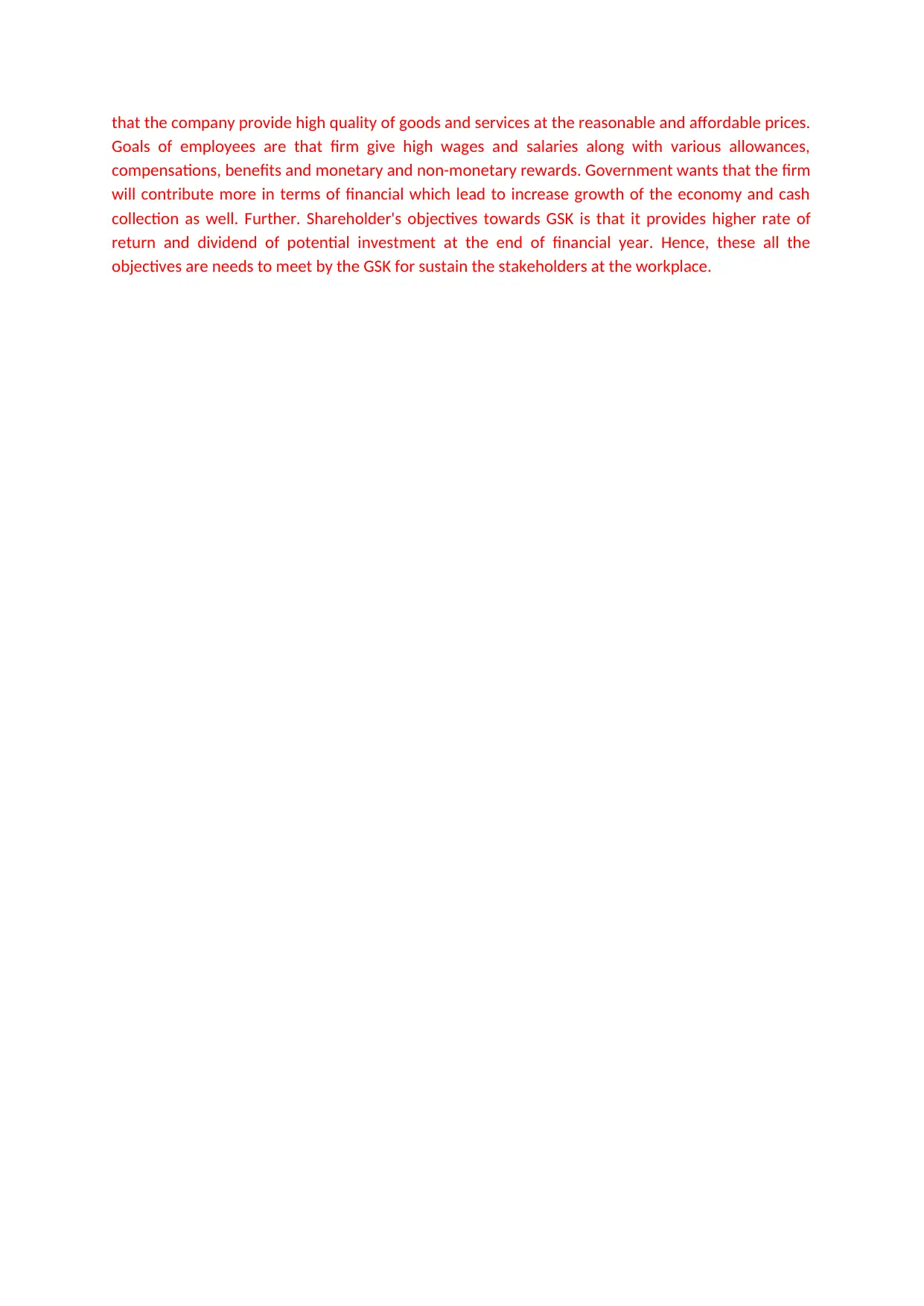
that the company provide high quality of goods and services at the reasonable and affordable prices.
Goals of employees are that firm give high wages and salaries along with various allowances,
compensations, benefits and monetary and non-monetary rewards. Government wants that the firm
will contribute more in terms of financial which lead to increase growth of the economy and cash
collection as well. Further. Shareholder's objectives towards GSK is that it provides higher rate of
return and dividend of potential investment at the end of financial year. Hence, these all the
objectives are needs to meet by the GSK for sustain the stakeholders at the workplace.
Goals of employees are that firm give high wages and salaries along with various allowances,
compensations, benefits and monetary and non-monetary rewards. Government wants that the firm
will contribute more in terms of financial which lead to increase growth of the economy and cash
collection as well. Further. Shareholder's objectives towards GSK is that it provides higher rate of
return and dividend of potential investment at the end of financial year. Hence, these all the
objectives are needs to meet by the GSK for sustain the stakeholders at the workplace.
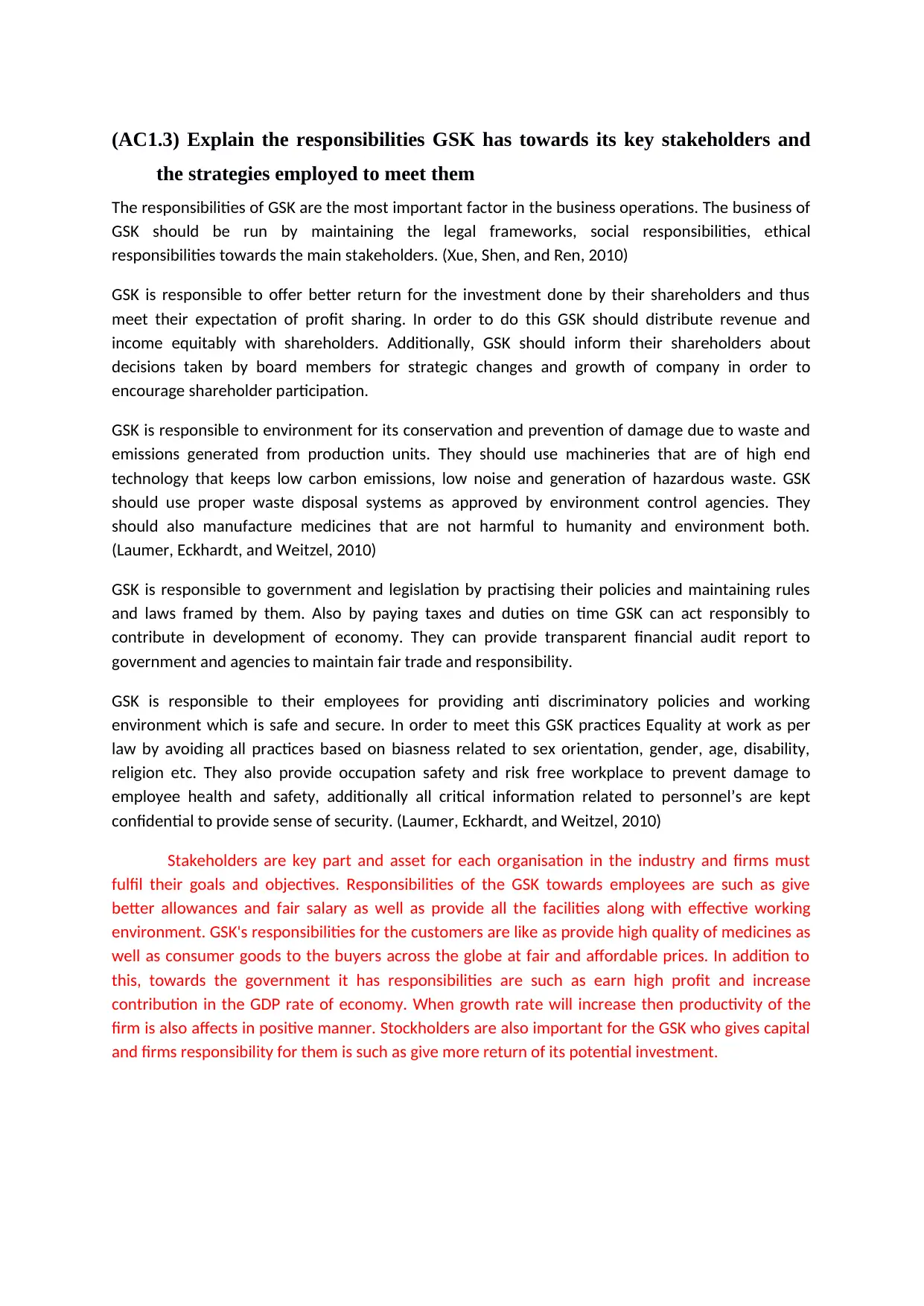
(AC1.3) Explain the responsibilities GSK has towards its key stakeholders and
the strategies employed to meet them
The responsibilities of GSK are the most important factor in the business operations. The business of
GSK should be run by maintaining the legal frameworks, social responsibilities, ethical
responsibilities towards the main stakeholders. (Xue, Shen, and Ren, 2010)
GSK is responsible to offer better return for the investment done by their shareholders and thus
meet their expectation of profit sharing. In order to do this GSK should distribute revenue and
income equitably with shareholders. Additionally, GSK should inform their shareholders about
decisions taken by board members for strategic changes and growth of company in order to
encourage shareholder participation.
GSK is responsible to environment for its conservation and prevention of damage due to waste and
emissions generated from production units. They should use machineries that are of high end
technology that keeps low carbon emissions, low noise and generation of hazardous waste. GSK
should use proper waste disposal systems as approved by environment control agencies. They
should also manufacture medicines that are not harmful to humanity and environment both.
(Laumer, Eckhardt, and Weitzel, 2010)
GSK is responsible to government and legislation by practising their policies and maintaining rules
and laws framed by them. Also by paying taxes and duties on time GSK can act responsibly to
contribute in development of economy. They can provide transparent financial audit report to
government and agencies to maintain fair trade and responsibility.
GSK is responsible to their employees for providing anti discriminatory policies and working
environment which is safe and secure. In order to meet this GSK practices Equality at work as per
law by avoiding all practices based on biasness related to sex orientation, gender, age, disability,
religion etc. They also provide occupation safety and risk free workplace to prevent damage to
employee health and safety, additionally all critical information related to personnel’s are kept
confidential to provide sense of security. (Laumer, Eckhardt, and Weitzel, 2010)
Stakeholders are key part and asset for each organisation in the industry and firms must
fulfil their goals and objectives. Responsibilities of the GSK towards employees are such as give
better allowances and fair salary as well as provide all the facilities along with effective working
environment. GSK's responsibilities for the customers are like as provide high quality of medicines as
well as consumer goods to the buyers across the globe at fair and affordable prices. In addition to
this, towards the government it has responsibilities are such as earn high profit and increase
contribution in the GDP rate of economy. When growth rate will increase then productivity of the
firm is also affects in positive manner. Stockholders are also important for the GSK who gives capital
and firms responsibility for them is such as give more return of its potential investment.
the strategies employed to meet them
The responsibilities of GSK are the most important factor in the business operations. The business of
GSK should be run by maintaining the legal frameworks, social responsibilities, ethical
responsibilities towards the main stakeholders. (Xue, Shen, and Ren, 2010)
GSK is responsible to offer better return for the investment done by their shareholders and thus
meet their expectation of profit sharing. In order to do this GSK should distribute revenue and
income equitably with shareholders. Additionally, GSK should inform their shareholders about
decisions taken by board members for strategic changes and growth of company in order to
encourage shareholder participation.
GSK is responsible to environment for its conservation and prevention of damage due to waste and
emissions generated from production units. They should use machineries that are of high end
technology that keeps low carbon emissions, low noise and generation of hazardous waste. GSK
should use proper waste disposal systems as approved by environment control agencies. They
should also manufacture medicines that are not harmful to humanity and environment both.
(Laumer, Eckhardt, and Weitzel, 2010)
GSK is responsible to government and legislation by practising their policies and maintaining rules
and laws framed by them. Also by paying taxes and duties on time GSK can act responsibly to
contribute in development of economy. They can provide transparent financial audit report to
government and agencies to maintain fair trade and responsibility.
GSK is responsible to their employees for providing anti discriminatory policies and working
environment which is safe and secure. In order to meet this GSK practices Equality at work as per
law by avoiding all practices based on biasness related to sex orientation, gender, age, disability,
religion etc. They also provide occupation safety and risk free workplace to prevent damage to
employee health and safety, additionally all critical information related to personnel’s are kept
confidential to provide sense of security. (Laumer, Eckhardt, and Weitzel, 2010)
Stakeholders are key part and asset for each organisation in the industry and firms must
fulfil their goals and objectives. Responsibilities of the GSK towards employees are such as give
better allowances and fair salary as well as provide all the facilities along with effective working
environment. GSK's responsibilities for the customers are like as provide high quality of medicines as
well as consumer goods to the buyers across the globe at fair and affordable prices. In addition to
this, towards the government it has responsibilities are such as earn high profit and increase
contribution in the GDP rate of economy. When growth rate will increase then productivity of the
firm is also affects in positive manner. Stockholders are also important for the GSK who gives capital
and firms responsibility for them is such as give more return of its potential investment.
⊘ This is a preview!⊘
Do you want full access?
Subscribe today to unlock all pages.

Trusted by 1+ million students worldwide
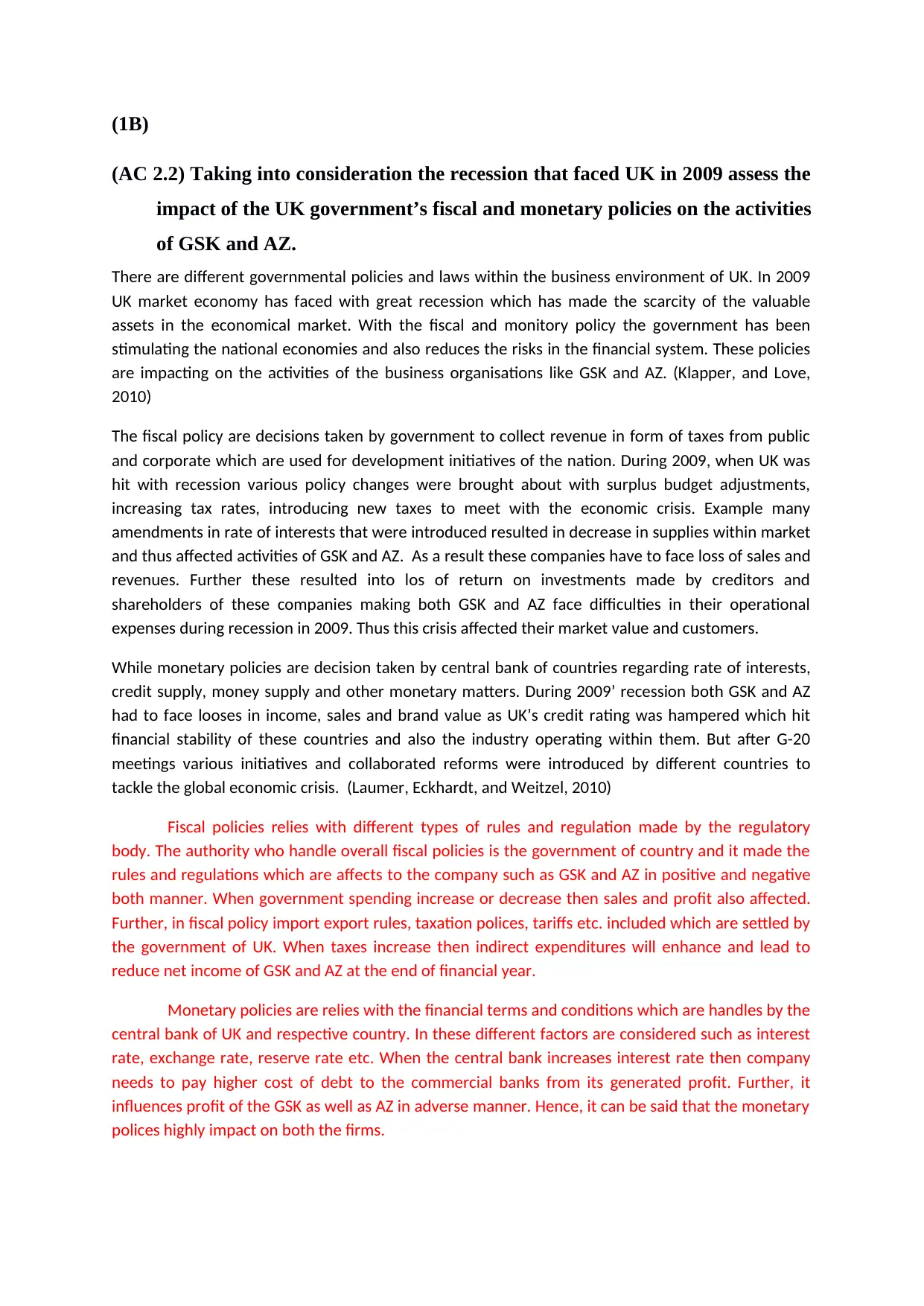
(1B)
(AC 2.2) Taking into consideration the recession that faced UK in 2009 assess the
impact of the UK government’s fiscal and monetary policies on the activities
of GSK and AZ.
There are different governmental policies and laws within the business environment of UK. In 2009
UK market economy has faced with great recession which has made the scarcity of the valuable
assets in the economical market. With the fiscal and monitory policy the government has been
stimulating the national economies and also reduces the risks in the financial system. These policies
are impacting on the activities of the business organisations like GSK and AZ. (Klapper, and Love,
2010)
The fiscal policy are decisions taken by government to collect revenue in form of taxes from public
and corporate which are used for development initiatives of the nation. During 2009, when UK was
hit with recession various policy changes were brought about with surplus budget adjustments,
increasing tax rates, introducing new taxes to meet with the economic crisis. Example many
amendments in rate of interests that were introduced resulted in decrease in supplies within market
and thus affected activities of GSK and AZ. As a result these companies have to face loss of sales and
revenues. Further these resulted into los of return on investments made by creditors and
shareholders of these companies making both GSK and AZ face difficulties in their operational
expenses during recession in 2009. Thus this crisis affected their market value and customers.
While monetary policies are decision taken by central bank of countries regarding rate of interests,
credit supply, money supply and other monetary matters. During 2009’ recession both GSK and AZ
had to face looses in income, sales and brand value as UK’s credit rating was hampered which hit
financial stability of these countries and also the industry operating within them. But after G-20
meetings various initiatives and collaborated reforms were introduced by different countries to
tackle the global economic crisis. (Laumer, Eckhardt, and Weitzel, 2010)
Fiscal policies relies with different types of rules and regulation made by the regulatory
body. The authority who handle overall fiscal policies is the government of country and it made the
rules and regulations which are affects to the company such as GSK and AZ in positive and negative
both manner. When government spending increase or decrease then sales and profit also affected.
Further, in fiscal policy import export rules, taxation polices, tariffs etc. included which are settled by
the government of UK. When taxes increase then indirect expenditures will enhance and lead to
reduce net income of GSK and AZ at the end of financial year.
Monetary policies are relies with the financial terms and conditions which are handles by the
central bank of UK and respective country. In these different factors are considered such as interest
rate, exchange rate, reserve rate etc. When the central bank increases interest rate then company
needs to pay higher cost of debt to the commercial banks from its generated profit. Further, it
influences profit of the GSK as well as AZ in adverse manner. Hence, it can be said that the monetary
polices highly impact on both the firms.
(AC 2.2) Taking into consideration the recession that faced UK in 2009 assess the
impact of the UK government’s fiscal and monetary policies on the activities
of GSK and AZ.
There are different governmental policies and laws within the business environment of UK. In 2009
UK market economy has faced with great recession which has made the scarcity of the valuable
assets in the economical market. With the fiscal and monitory policy the government has been
stimulating the national economies and also reduces the risks in the financial system. These policies
are impacting on the activities of the business organisations like GSK and AZ. (Klapper, and Love,
2010)
The fiscal policy are decisions taken by government to collect revenue in form of taxes from public
and corporate which are used for development initiatives of the nation. During 2009, when UK was
hit with recession various policy changes were brought about with surplus budget adjustments,
increasing tax rates, introducing new taxes to meet with the economic crisis. Example many
amendments in rate of interests that were introduced resulted in decrease in supplies within market
and thus affected activities of GSK and AZ. As a result these companies have to face loss of sales and
revenues. Further these resulted into los of return on investments made by creditors and
shareholders of these companies making both GSK and AZ face difficulties in their operational
expenses during recession in 2009. Thus this crisis affected their market value and customers.
While monetary policies are decision taken by central bank of countries regarding rate of interests,
credit supply, money supply and other monetary matters. During 2009’ recession both GSK and AZ
had to face looses in income, sales and brand value as UK’s credit rating was hampered which hit
financial stability of these countries and also the industry operating within them. But after G-20
meetings various initiatives and collaborated reforms were introduced by different countries to
tackle the global economic crisis. (Laumer, Eckhardt, and Weitzel, 2010)
Fiscal policies relies with different types of rules and regulation made by the regulatory
body. The authority who handle overall fiscal policies is the government of country and it made the
rules and regulations which are affects to the company such as GSK and AZ in positive and negative
both manner. When government spending increase or decrease then sales and profit also affected.
Further, in fiscal policy import export rules, taxation polices, tariffs etc. included which are settled by
the government of UK. When taxes increase then indirect expenditures will enhance and lead to
reduce net income of GSK and AZ at the end of financial year.
Monetary policies are relies with the financial terms and conditions which are handles by the
central bank of UK and respective country. In these different factors are considered such as interest
rate, exchange rate, reserve rate etc. When the central bank increases interest rate then company
needs to pay higher cost of debt to the commercial banks from its generated profit. Further, it
influences profit of the GSK as well as AZ in adverse manner. Hence, it can be said that the monetary
polices highly impact on both the firms.
Paraphrase This Document
Need a fresh take? Get an instant paraphrase of this document with our AI Paraphraser
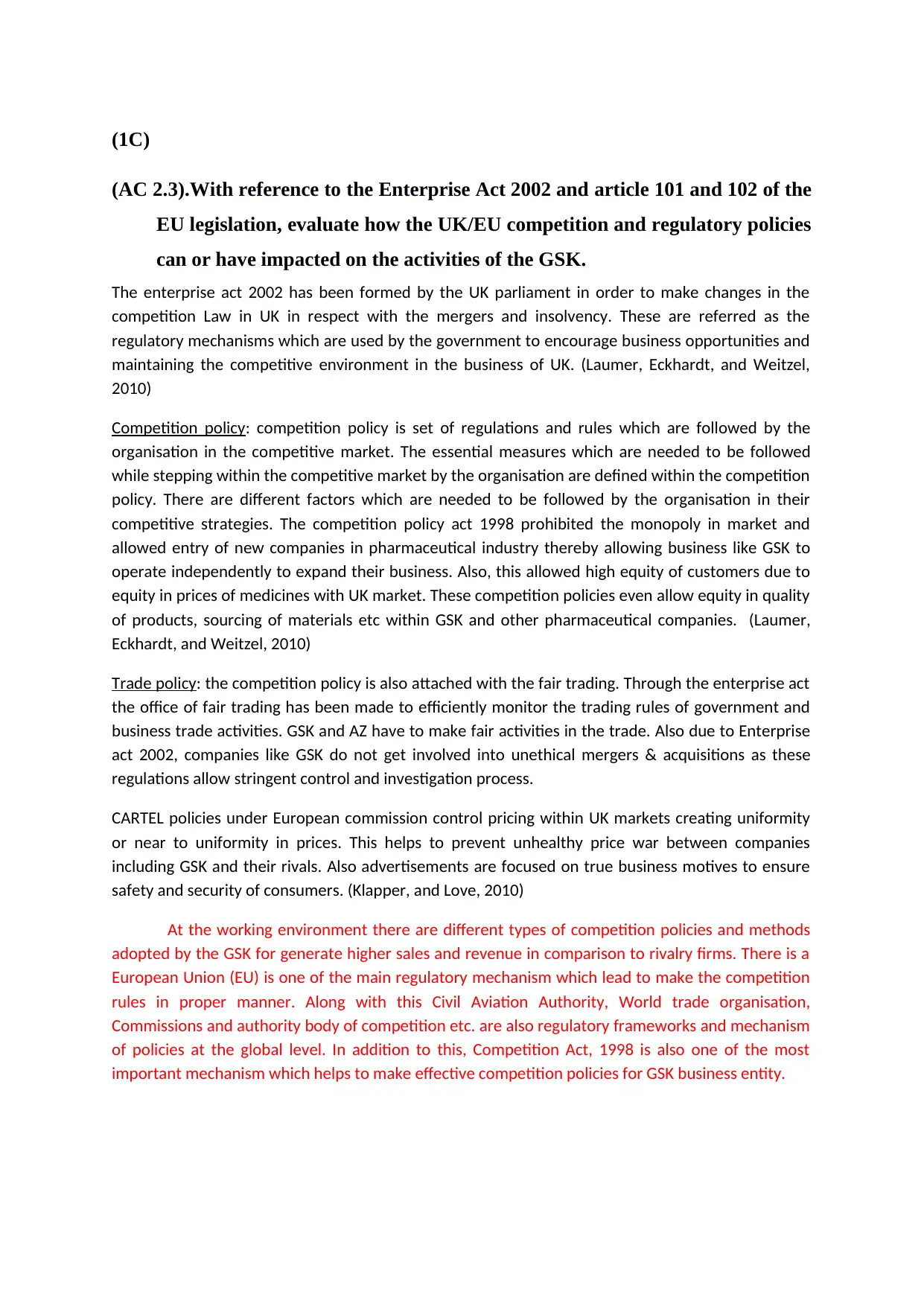
(1C)
(AC 2.3).With reference to the Enterprise Act 2002 and article 101 and 102 of the
EU legislation, evaluate how the UK/EU competition and regulatory policies
can or have impacted on the activities of the GSK.
The enterprise act 2002 has been formed by the UK parliament in order to make changes in the
competition Law in UK in respect with the mergers and insolvency. These are referred as the
regulatory mechanisms which are used by the government to encourage business opportunities and
maintaining the competitive environment in the business of UK. (Laumer, Eckhardt, and Weitzel,
2010)
Competition policy: competition policy is set of regulations and rules which are followed by the
organisation in the competitive market. The essential measures which are needed to be followed
while stepping within the competitive market by the organisation are defined within the competition
policy. There are different factors which are needed to be followed by the organisation in their
competitive strategies. The competition policy act 1998 prohibited the monopoly in market and
allowed entry of new companies in pharmaceutical industry thereby allowing business like GSK to
operate independently to expand their business. Also, this allowed high equity of customers due to
equity in prices of medicines with UK market. These competition policies even allow equity in quality
of products, sourcing of materials etc within GSK and other pharmaceutical companies. (Laumer,
Eckhardt, and Weitzel, 2010)
Trade policy: the competition policy is also attached with the fair trading. Through the enterprise act
the office of fair trading has been made to efficiently monitor the trading rules of government and
business trade activities. GSK and AZ have to make fair activities in the trade. Also due to Enterprise
act 2002, companies like GSK do not get involved into unethical mergers & acquisitions as these
regulations allow stringent control and investigation process.
CARTEL policies under European commission control pricing within UK markets creating uniformity
or near to uniformity in prices. This helps to prevent unhealthy price war between companies
including GSK and their rivals. Also advertisements are focused on true business motives to ensure
safety and security of consumers. (Klapper, and Love, 2010)
At the working environment there are different types of competition policies and methods
adopted by the GSK for generate higher sales and revenue in comparison to rivalry firms. There is a
European Union (EU) is one of the main regulatory mechanism which lead to make the competition
rules in proper manner. Along with this Civil Aviation Authority, World trade organisation,
Commissions and authority body of competition etc. are also regulatory frameworks and mechanism
of policies at the global level. In addition to this, Competition Act, 1998 is also one of the most
important mechanism which helps to make effective competition policies for GSK business entity.
(AC 2.3).With reference to the Enterprise Act 2002 and article 101 and 102 of the
EU legislation, evaluate how the UK/EU competition and regulatory policies
can or have impacted on the activities of the GSK.
The enterprise act 2002 has been formed by the UK parliament in order to make changes in the
competition Law in UK in respect with the mergers and insolvency. These are referred as the
regulatory mechanisms which are used by the government to encourage business opportunities and
maintaining the competitive environment in the business of UK. (Laumer, Eckhardt, and Weitzel,
2010)
Competition policy: competition policy is set of regulations and rules which are followed by the
organisation in the competitive market. The essential measures which are needed to be followed
while stepping within the competitive market by the organisation are defined within the competition
policy. There are different factors which are needed to be followed by the organisation in their
competitive strategies. The competition policy act 1998 prohibited the monopoly in market and
allowed entry of new companies in pharmaceutical industry thereby allowing business like GSK to
operate independently to expand their business. Also, this allowed high equity of customers due to
equity in prices of medicines with UK market. These competition policies even allow equity in quality
of products, sourcing of materials etc within GSK and other pharmaceutical companies. (Laumer,
Eckhardt, and Weitzel, 2010)
Trade policy: the competition policy is also attached with the fair trading. Through the enterprise act
the office of fair trading has been made to efficiently monitor the trading rules of government and
business trade activities. GSK and AZ have to make fair activities in the trade. Also due to Enterprise
act 2002, companies like GSK do not get involved into unethical mergers & acquisitions as these
regulations allow stringent control and investigation process.
CARTEL policies under European commission control pricing within UK markets creating uniformity
or near to uniformity in prices. This helps to prevent unhealthy price war between companies
including GSK and their rivals. Also advertisements are focused on true business motives to ensure
safety and security of consumers. (Klapper, and Love, 2010)
At the working environment there are different types of competition policies and methods
adopted by the GSK for generate higher sales and revenue in comparison to rivalry firms. There is a
European Union (EU) is one of the main regulatory mechanism which lead to make the competition
rules in proper manner. Along with this Civil Aviation Authority, World trade organisation,
Commissions and authority body of competition etc. are also regulatory frameworks and mechanism
of policies at the global level. In addition to this, Competition Act, 1998 is also one of the most
important mechanism which helps to make effective competition policies for GSK business entity.
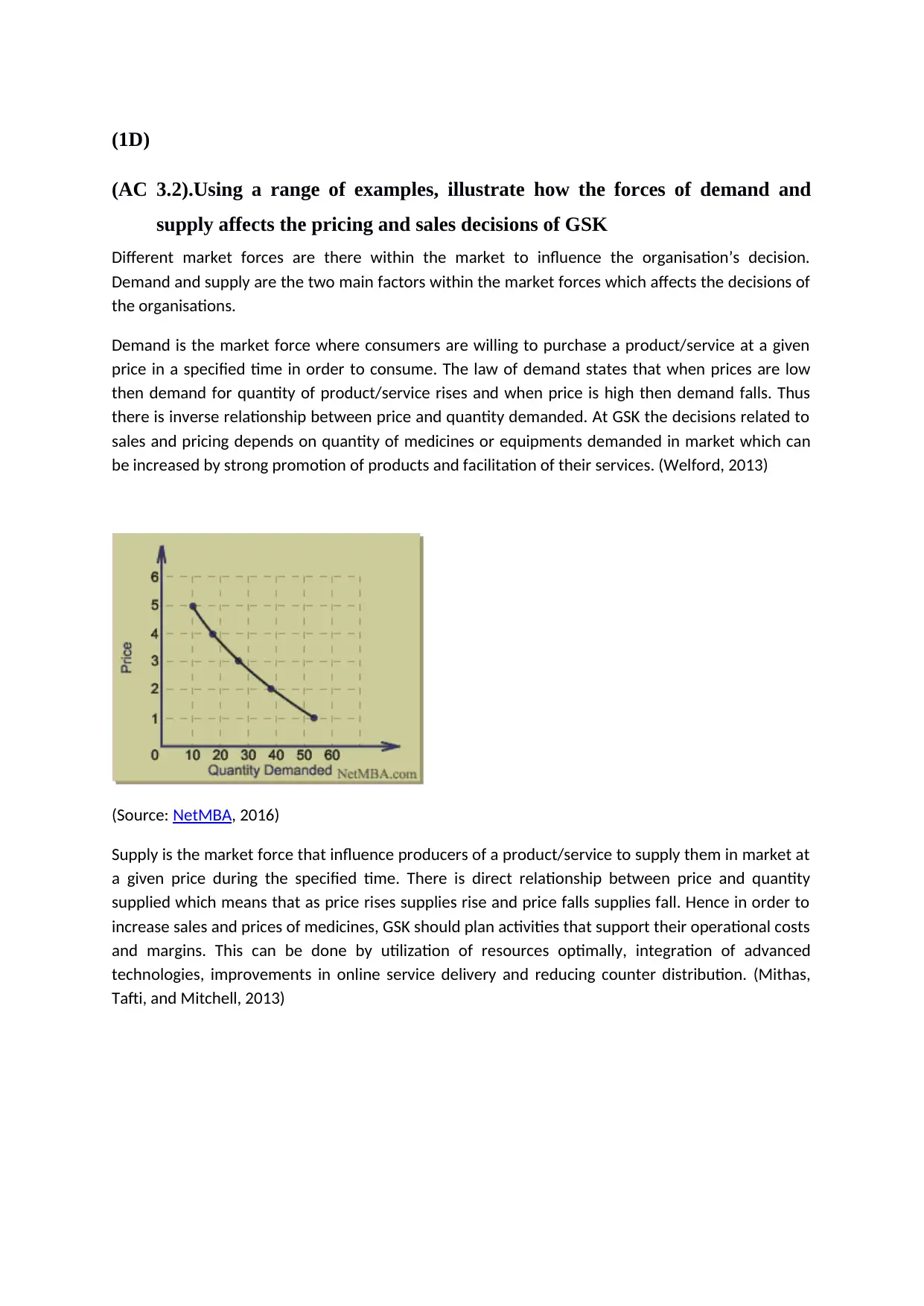
(1D)
(AC 3.2).Using a range of examples, illustrate how the forces of demand and
supply affects the pricing and sales decisions of GSK
Different market forces are there within the market to influence the organisation’s decision.
Demand and supply are the two main factors within the market forces which affects the decisions of
the organisations.
Demand is the market force where consumers are willing to purchase a product/service at a given
price in a specified time in order to consume. The law of demand states that when prices are low
then demand for quantity of product/service rises and when price is high then demand falls. Thus
there is inverse relationship between price and quantity demanded. At GSK the decisions related to
sales and pricing depends on quantity of medicines or equipments demanded in market which can
be increased by strong promotion of products and facilitation of their services. (Welford, 2013)
(Source: NetMBA, 2016)
Supply is the market force that influence producers of a product/service to supply them in market at
a given price during the specified time. There is direct relationship between price and quantity
supplied which means that as price rises supplies rise and price falls supplies fall. Hence in order to
increase sales and prices of medicines, GSK should plan activities that support their operational costs
and margins. This can be done by utilization of resources optimally, integration of advanced
technologies, improvements in online service delivery and reducing counter distribution. (Mithas,
Tafti, and Mitchell, 2013)
(AC 3.2).Using a range of examples, illustrate how the forces of demand and
supply affects the pricing and sales decisions of GSK
Different market forces are there within the market to influence the organisation’s decision.
Demand and supply are the two main factors within the market forces which affects the decisions of
the organisations.
Demand is the market force where consumers are willing to purchase a product/service at a given
price in a specified time in order to consume. The law of demand states that when prices are low
then demand for quantity of product/service rises and when price is high then demand falls. Thus
there is inverse relationship between price and quantity demanded. At GSK the decisions related to
sales and pricing depends on quantity of medicines or equipments demanded in market which can
be increased by strong promotion of products and facilitation of their services. (Welford, 2013)
(Source: NetMBA, 2016)
Supply is the market force that influence producers of a product/service to supply them in market at
a given price during the specified time. There is direct relationship between price and quantity
supplied which means that as price rises supplies rise and price falls supplies fall. Hence in order to
increase sales and prices of medicines, GSK should plan activities that support their operational costs
and margins. This can be done by utilization of resources optimally, integration of advanced
technologies, improvements in online service delivery and reducing counter distribution. (Mithas,
Tafti, and Mitchell, 2013)
⊘ This is a preview!⊘
Do you want full access?
Subscribe today to unlock all pages.

Trusted by 1+ million students worldwide
1 out of 23
Related Documents
Your All-in-One AI-Powered Toolkit for Academic Success.
+13062052269
info@desklib.com
Available 24*7 on WhatsApp / Email
![[object Object]](/_next/static/media/star-bottom.7253800d.svg)
Unlock your academic potential
Copyright © 2020–2026 A2Z Services. All Rights Reserved. Developed and managed by ZUCOL.





